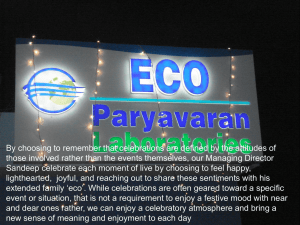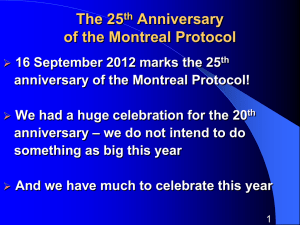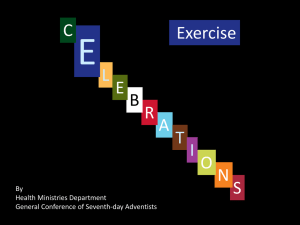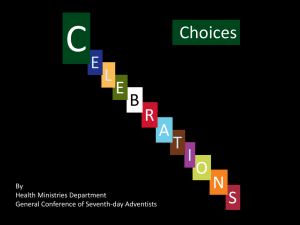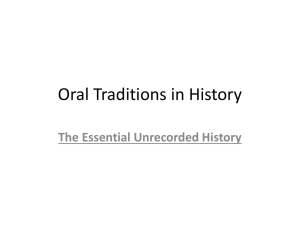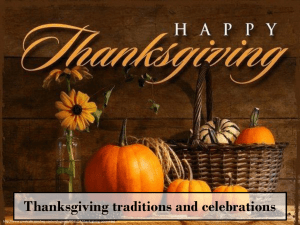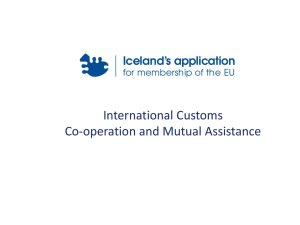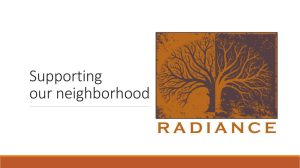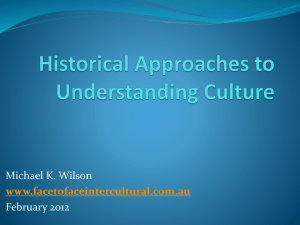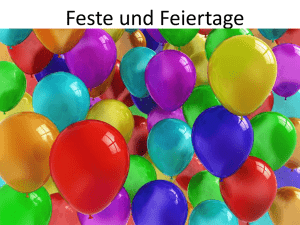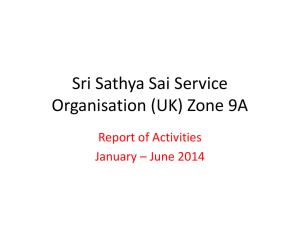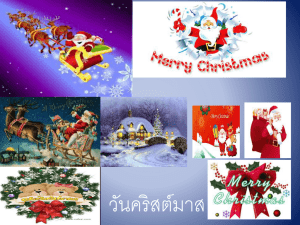AUTUMN CUSTOMS AND TRADITIONS
advertisement
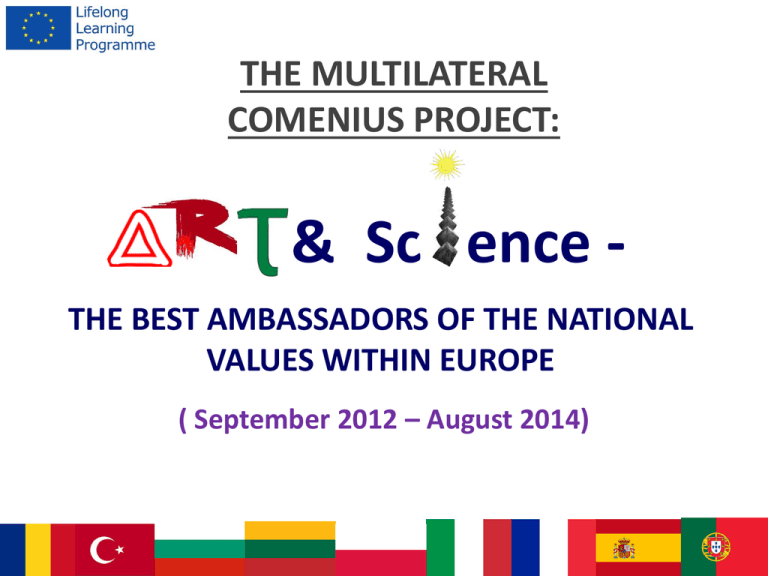
THE MULTILATERAL COMENIUS PROJECT: & Sc ence THE BEST AMBASSADORS OF THE NATIONAL VALUES WITHIN EUROPE ( September 2012 – August 2014) UNITY IN DIVERSITY ? • • • • • As the EU motto suggests, the European culture might better be described as a series of multiple cultures, often competing: geographical regions opposing one another, different branches of Christianity, which are similar, but still different, many traditions rooted in ancient customs, etc. There are many cultural innovations and movements, often at odds with each other, which makes the question of "common culture" or "common values" much more complex than it seems to be. Historically speaking, upon the pagan cultures of aboriginal Europe, the foundations of modern European cultures[1] were laid by the Greeks, strengthened by the Romans, stabilized by Christianity, added to by the rest of Europe, reformed and modernized by the fifteenthcentury Renaissance and Reformation, and globalized by successive European empires between the sixteenth and twentieth centuries. Thus the European Culture developed into a very complex phenomenon which developed through a long age of change and formation with the experiments of enlightenment, naturalism, romanticism, science, democracy, fascism, communism, and socialism. In what follows, we, the project partners, are going to present the most important customs and tradition specific to our countries, trying to find what individualizes each of our countries and what is common to all of us. During the transnational mobilities ,we all had the opportunity to experience and feel that there are many things, traditions, customs, values which unite us, are common to all of us and some, but much fewer which are unique. References: 1. Sailen Debnath, Secularism: Western and Indian, ISBN 9788126913664, Atlantic Publishers, New Delhi AUTUMN CUSTOMS AND TRADITIONS COUNTRY SPECIFIC CUSTOMS AND TRADITIONS BULGARIA The Unification of Bulgaria, The Bulgarian Revival Day, Dimitrovden, Archangel ‘s Day FRANCE Popular celebrations: Grape harvest feast Christian celebrations:The Holy Friday ITALY Pagan celebrations: Giochi delle Porte, Palios, Village Fairs with seasonal produce, Grape Harvest, The Greasy Pole Christian celebrations: St Francis’s Day, St Martin’s Day, All Saints’ Day, Commemoration of All the Faithful Departed LITHUANIA Pagan celebrations: Harvest festival, All Souls’ Day Non religious celebrations:1st of September, Teachers’ Day, New Students’ Inauguration day, The Day of Tolerance POLAND Religious celebrations: Rosary. Day of Pope John Paul II, All Saint’s Day, Advent National celebrations: The Day of National Education, Independence Day, Miners Day Mixed celebrations: St. Andrew’s Day, St. Nicholas Day PORTUGAL Christian celebrations: St Martin’s Day, All Saints’ Day Mixed celebrations:Grape harvest ROMANIA Pagan celebrations: Shepherds autumn descent from the mountain “Răvăşitul oilor”, Cosma, Samedru’s Fires Christian celebrations:The Holy Friday, Shrove Tuesday, Saint Andrew’s Day, Mixed celebrations: The Cross Day, Ovidenia festival SPAIN Mixed celebrations: Los Finaos: Song singing and dancing (pagan) celebrated the 1st of Nov. When relatives go to mass and cemeteries to remember those passed away (relig.) TURKEY Non-Religious Customs: Republic day,the 10th of November is the death anniversary of our founder Ataturk , he 24th of November –Teacher’s day Religious Customs: Sacrifice Day WINTER CUSTOMS AND TRADITIONS COUNTRY SPECIFIC CUSTOMS AND TRADITIONS BULGARIA Saint Nichola’s Day , Ignazhden, Christmas Eve , Christmas, Stefanovden, New Year’s Eve , Surva , Vasilyovden, Iordanovden , Ivanovden, Atanasovden FRANCE Religiuos celebrations: Advent, Saint Nicholas, Christmas, Epiphany Popular traditions: Valentines Lovers’ Day ITALY Religious celebrations: St Nicolò’s Nativity , Christmas: Christmas Eve, Christmas Day, typical food, Midnight Mass, New Year’s Eve, Epiphany, St Anthony’s:Bonfires and the Blessing of the Animals Pagan celebrations: Bonfires, Killing the pig, LaBefana, Carnival, San Valentine’s Day, Women’s Day , Father’s Day LITHUANIA Pagan celebrations: Christmas Eve-Kucios, Shrovetide Christian celebrations: Advent, Three Kings Mixed celebrations: Christmas, Asch day. No. religious celebrations:The New Year’s day. POLAND Religious celebrations: Christmas Day , Symbols and habits of Christmas: Additional cover, Hay under the tablecloth, Wafer, Singing Christmas Carols, Nativity, Midnight Mass, Feast of the Epiphany, Ash Wednesday Non- Religious celebrations: Christmas tree, First star, Santa Claus, Gwiżdże, New Year’s Eve, The last Thursday of Carnival – Shrove Tuesday, Grandma and Grandpa Day, Valentine’s Day, Women’s Day Typical Christmas Meals WINTER CUSTOMS AND TRADITIONS COUNTRY SPECIFIC CUSTOMS AND TRADITIONS PORTUGAL Religious celebrations:Christmas: Christmas Eve, Christmas Day, typical, food, Midnight Mass, New Year’s Eve Pagan celebrations: Rooster feast, Killing the pig, Janeiras (carols to welcome the new year), Carnival ROMANIA Religiuos celebrations: Saint Nicholas, Christmas, Epiphany; Christian Caroling: The Star, Saint John Pagan Caroling: The Goat, The Bear, The Little Plough, Sorcova Pagan celabrations: Ignatul (pig slaughtering), Dragobetele- Lovers’ Day Non-religious celebrations: The National Day(December, 1st) Typical Christmas food, Typical superstitions SPAIN Pagan celebrations: Carnival, New year, parties, typical food, superstition, New year’s resolution, eating the 12 grapes for good luck…. Religious celebrations: Christmas eve and Christmas day. Family gathering, typical food, Carol singing, going to mass, 5th of January 3 kings night, parade, presents, exchanging presents among family members, typical food Non- religious celebrations: Gran Canaria Marathon, Sport under good weather TURKEY Non-Religious Customs: Chirstmas Day, Lovers day Typical winter food and traditional drinks, Winter activities. SPRING CUSTOMS AND TRADITIONS COUNTRY SPECIFIC CUSTOMS AND TRADITIONS BULGARIA Baba Marta Day , Sirni Zagovezni, Kukeri, Todorovden, Blagoveshtenie (the Annuncitaion), Lazarovden, Palm Sunday, Easter, Saint George, Saint Constantine and Helen, Day of Bulgarian Education and Culture and Slavonic Literature, FRANCE Religiuos celebrations: Palm Day, Great Thursday, Great Friday Easter, The Pentecost, Typical Easter Food Popular traditions: Mother’s Day, Spring parties, April fools, Labour day, Europe’s day ITALY Historical events: April 25th, Labour Day(1st May) , Italian Republic Anniversary ( 2nd June) Religious celebrations: Procession of the Dead Christ, Good Friday Easter with traditions, Corpus Domini with floral decoration and processions Typical Easter Food Religious traditions:Different festivities honoring saints : e.g, St Ubaldo’s Day(16th May) Mixed Celebrations: The Ceri race (15TH May), May Day Festival Popular traditions: Poplar Festival (30th April), The Ceri race, St Ubaldo’s fair (17th May), The Crossbow Contest, Mother’s day. LITHUANIA Mixture of religious beliefs and pagan traditions: St.Kazimiera’s (Starlings’ day), Easter, ST George’s day (Jore). Non Religious celebrations: Mother’s day. POLAND Religious celebrations: Palm Sunday, Maundy Thursday, Friday and Saturday, Easter , Easter Monday Symbols and habits of Easter: Painting Easter eggs, Pentecost, Corpus Christi Non-Religious celebrations: Melting madder, First day of Spring Symbols and habits of Easter: Easter Bunny, Rajby, April Fool’s Day, Mother’s Day, Children’s Day, Midsummer’s Day Typical Easter Foods National celebrations: Labour Day , Constitution of May 3, Fireman and Metallurgist Day SPRING CUSTOMS AND TRADITIONS COUNTRY SPECIFIC CUSTOMS AND TRADITIONS PORTUGAL Historical events: April 25th , National holiday (June 10th) Religious celebrations: Different festivities signaled with flowers (carpets, trays, songs, parades) Easter traditions Popular traditions: Burning the stripes (university tradition), Mother’s Day, April Fool’s Day ROMANIA Non-Religious Customs: Martisorul – the 1st of March, Babele- The Old Ladies Religiuos celebrations: The 40 Martyrs, Flowers Day, Palm Day Great Thursday, Great Friday Easter, The Small Fountain and Good Peoples’ Easter, The Pentecost Typical Easter Food; Typical superstitions SPAIN Religious celebrations: Easter celebrations, Thursday and good Friday, Palm Sunday, processions, mass, eating fish and no meat, Corpus Christi, carpet made out of flowers. Family gatherings. Other Traditions: On Easter those who are not religious will spend their holidays in a holiday resort sunbathing and enjoying the good weather . Non- Religious Celebrations: Canary day 30th May, typical costumes , food, dance and music, Trans Gran Canaria: Sport competition going on since 2003, crosses the island max. 119km. Min. 24km TURKEY Non-Religious Customs: National sovereignty and children’s day, May first-ınternational workers day, Youth and sports day Mothers day, April Fool’s days. SUMMER CUSTOMS AND TRADITIONS COUNTRY SPECIFIC CUSTOMS AND TRADITIONS BULGARIA Rousalska Nedelya , Valeria’s Day, Vartolomeevden, Liseevden, Vidovden, Enyovden, Petrovden, Pavliovden (Staint Paul’s day), St. Vrach, Prokopi Pchelar (Prokopius the Beekeeper, Vladimirovden, Yulianovden, Ilinden, Panteleevden, Bogorodichni Zagovezni, Makaveyan days, Preobrazhenie, Golyama Bogoroditsa FRANCE Christian celebrations: The Pentecost Popular traditions: Saint Jean bone fires, National day: July 14th, with military parade on the Champs Elysées, fireworks Events: Festival de Cannes ITALY Christian celebrations: The Pentecost, The Assumption Religious traditions: Different festivities honoring saints with fairs: e.g St John’s Day(24th June) Popular traditions: Gaite,Palio of Siena,Joust of Quintana, Fairs in the villages for the Threshing and the Harvest . LITHUANIA Christian celebration: St. Jacob’s Day, St. Ann’s Day, St Peter’s and St. Paul’s Day. Mixture of religious beliefs and pagan traditions: -St. John’s Day (Mid summer’s day), The Assumption of the Virgin Mary Non religious celebrations: Father’s day, Lithuanian King’s Mindaugas Coronation day, Song Festival, Sea’s Day POLAND Religous celebrations: St. Christopher’s Day, Feast of the Assumpion of Holy Mary, Pilgrimages Mixed celebrations: The night of St. John Babtist Non- religious celebrations: Killing a kite bird, Strawberry collecting, Hay making, Harvest, Harvest festival, Taking snuff of tabacco, Pottery, Basketry SUMMER CUSTOMS AND TRADITIONS COUNTRY SPECIFIC CUSTOMS AND TRADITIONS PORTUGAL Pagan traditions: Cows of fire, Serragem da Velha (celebration of the end of the harvest) Religious traditions: Different festivities honoring saints: examples :St John, St Sebastian Popular traditions: Emigrant feast ROMANIA Mixture of religious beliefs and pagan traditions: Midsummer Day (Sânzienele/Dragaica Feast)- St John The Baptist’s Birth Christian celebrations: The Pentecost, Saint Elijah, The Assumption of the Virgin Mary Non-religious/pagan traditions: Calusarii, Ielele,The Maidens Fair on Mount Găina, Caloianul/Paparudele- The Rain makers, The Summer Old People; Typical superstitions SPAIN Mixed celebrations : -LaRama de Agaete 4th-5th August in honor of the Virgin ( religious), Branches used to hit the sea to ask the gods for rain ( pagan) now they are shaked in the air in honor of the Virgin ( religious. -- Bajada del gofio: In honour of the virgin, last Sat. September, commemorates the importance of water and gofio ( a flour made with different grains and maized) basic elements in the canarian diet Religious traditions: Virgin Pino: Patron saint of Gran Canaria celebrated 8th sep, religious pilgrimage up to the village of Teror to ask for good health, there are offerings, dancing and singing, typical costume and food, processions, parades -- Corpus Christi: Also celebrated in summer, processions, flower and colourful sand carpets, mass -Pagan Traditions: The night of Saint John: Conmemorates the summer solstice giving power to the sun, there is a lot of superstitions and rituals held, fire, sea, fruit. -El Charco de San Nicolás: Commemorates the pagan tradition in which the sea plays an important role as fish pantry. The rising of the sea created a small seawater lake which trapped the fish for the aborigines to capture. Celebrated 11th sep. - Suelta del Perro Maldito ( 28th sep. Night of St. Michael people dressed as dogs who represent the devil escaping from the chains of the Archagel Michael) -Vará del Pescao: ( last friday of August, held in honor of the fishermen and their traditional way of fishing. TURKEY Non-Religious Customs: 30th of August-Victory day, School report day, Appricot Festival, Band and liver festival Religious Customs: Ramadan Feast CONCLUSION: MORE SIMILAR THAN DIFFERENT! SIMILARITIES DIFFERENCES - There are few autumn traditions, all the other seasons are richer in traditions in all the 9 countries; -In all the countries involved in the project (except for Turkey, of course), the Christian traditions mix with the pagan ones; -The major Christian celebrations are similarly observed, even though the partners belong to different branches of Christianity; -There are special symbols used in each of the seasons, which are common to all, for example flowers, eggs, water , masks; -The pagan traditions are meant to bring luck, health and to protect people from evil, misfortunes, etc. - The food cooked on different celebrations is, in most cases, similar; -There are many common international/European days and celebrations - There are dates and celebrations, especially non-religious, which are specific to each country and are related to political, social and historical moments; - The religious calendars are different in the case of Easter, which is celebrated on different occasions or dates. - Different countries use specific symbols, for example fire and amulets; -The Western countries have more carnivals and processions than the Eastern countries; -Turkey has some celebrations which are, of course, unique (The Ramadan, for example)
